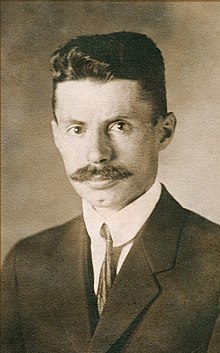| This article includes a list of references, related reading, or external links, but its sources remain unclear because it lacks inline citations. Please help improve this article by introducing more precise citations. (May 2023) (Learn how and when to remove this message) |
| Vyacheslav Lypynsky | |
|---|---|
| В'ячеслав Липинський | |
 Lypynsky in 1921 Lypynsky in 1921 | |
| Born | (1882-04-05)5 April 1882 Zaturtsi [uk], Russian Empire (now Ukraine) |
| Died | 14 June 1931(1931-06-14) (aged 49) Pernitz, First Austrian Republic |
| Nationality | Polish |
| Academic background | |
| Alma mater | Jagiellonian University |
| Academic work | |
| Notable ideas | Ukrainian conservatism [uk], Hetmanate movement [uk] |
| Influenced | Pavlo Skoropadskyi, Dmytro Doroshenko |
Vyacheslav (Viacheslav) Kazymyrovych Lypynsky (5 April 1882 — 14 June 1931) was a Ukrainian historian, social and political activist, an ideologue of Ukrainian conservatism. He was also the founder of the Ukrainian Democratic–Agrarian Party. Under the government of Hetmanate, he served as the Ukrainian ambassador to Austria.
Biography
Lypynsky was born in Zaturtsi (now in Volyn Oblast) into a family of Polish noble origins. After completing secondary school in Kyiv, he studied philosophy, agronomy and history at Jagiellonian University in Kraków. Lypynsky developed a particular interest in military matters and in the study of the ways in which, historically, the nobility shaped Ukrainian statehood, ultimately calling on the nobility within Ukraine to fight for that nation's rebirth. During the First World War he served as an officer in the Russian army, and afterward became involved in the struggle for Ukrainian independence, serving as the Ukrainian government's ambassador to Austria under the government of the Ukrainian Hetmanate as well as its successor, the Directorate of Ukraine. He then lived abroad, in Berlin and Vienna, and became head of the Ukrainian Agrarian Statist Party as well as a leading monarchist, supporting the Ukrainian Hetman Pavlo Skoropadskyi. He died in the "Sanatorium Wienerwald" near Pernitz in 1931.
Views

A conservative monarchist, Lypynsky was critical of the populism and socialism of the leadership of the Central Council and Directorate of Ukraine, which emphasised the workers and intelligentsia as a source of support. Instead, Lypynsky proposed that the focus of the struggle of independence should be built around the peasantry, the bourgeois, and the elite. Accordingly, he felt that a primary focus in the struggle for Ukrainian independence should be the conversion of the Russified or Polonized Ukrainian elite or nobility to the cause of Ukrainian statehood. Lypynsky wrote that Ukrainian statehood depended on the loyalty of the Ukrainian population towards the Ukrainian state regardless of ethnic origins or social status. A Ukrainian monarch, such as a Hetman, was seen by Lypynsky as essential in cementing the loyalties of the members of various social classes and ethnicities. Although opposed to democracy, Lypynsky's national and class inclusiveness was also opposed to the integral nationalist ideology of his rival Dmytro Dontsov.
Works
- Szlachta na Ukrainie. Udział jej w życiu narodu na tle jego dziejów (1909)
- Stanisław Michał Krzyczewski. Z dziejów walki szlachty ukraińskiej w szeregach powstańczych pod wodzą Bohdana Chmielnickiego (1912)
- Z dziejów Ukrainy. Księga pamiątkowa ku czci Włodzimierza Antonowicza, Paulina Święcickiego i Tadeusza Rylskiego, wydana staraniem dr. J. Jurkiewicza, Fr. Wolskiej, Ludw. Siedleckiego i Wacława Lipińskiego (1913)
- Lysty do brativ chiliborobiv (1926)
Notes
Sources
- Dovidnyk z istoriï Ukraïny, 3-Volumes, "Vyacheslav Lypynsky Archived 23 January 2010 at the Wayback Machine" (t. 2), Kyiv, 1993-1999, ISBN 5-7707-5190-8 (t. 1), ISBN 5-7707-8552-7 (t. 2), ISBN 966-504-237-8 (t. 3).
External links
Categories:- 1882 births
- 1931 deaths
- People from Volyn Oblast
- People from Volhynian Governorate
- Jagiellonian University alumni
- University of Geneva alumni
- Polish nobility
- Ruthenian nobility
- 20th-century Ukrainian historians
- Ukrainian democracy activists
- Ukrainian monarchists
- Ukrainian politicians before 1991
- Ukrainian State
- Ambassadors of Ukraine to Austria
- People who emigrated to escape Bolshevism
- Ukrainian people of Polish descent
- People from the Russian Empire of Polish descent
- Russian military personnel of World War I
- Recipients of the Order of Saint Stanislaus (Russian), 3rd class